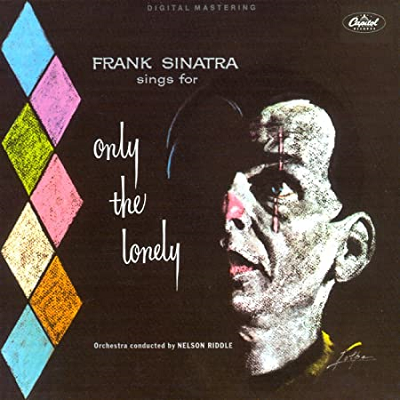9. Frank SinatraOnly The Lonely

Although now they’re remembered as guys in suits, The Rat Pack probably had more toxic masculinity than Fat White Family. I went through an era of buying into an idea of faded glamour, and I got really into the lore around The Rat Pack and that era of crazy stories that I think are more interesting than the stories of rock ‘n’ roll excess in biographies of the Red Hot Chili Peppers or Motley Crue. I love that Sinatra basically had two styles of albums, his ‘up’ albums and his ‘down’ albums. The down ones are so down, everything’s about being heartbroken or suicidal. There’s an album called No One Cares, where on the cover he’s at the bar and everyone’s chatting around him, not even the barman’s paying attention. I loved that you had someone who was such a big star, one of the most loved singers in the world, but his schtick was that no one gave a shit. In the artwork for this one he has clown makeup and a single tear.
It’s just, super bombastic, dark in a theatrical way, a great example of his singing, but also, I love the fact that he didn’t write a note of music or a word of lyrics and yet encapsulated it so. I re-read the back of the record for this interview, and the liner notes from the guys who wrote the songs on it said it was a good day if he gave you a nod when you played the song for the first time. I think he was going through his divorce from Ava Gardner at the time, who was the only woman he ever loved. This is the ultimate sad boy album for the ultimate star, when the one person they want doesn’t want them. I almost chose Drake’s Take Care and that’s probably the same as him and Rihanna, where there’s one person that everyone wants a piece of except the one they can’t have. The music’s arranged by Nelson Riddle, whose mother and daughter had just died before making it. He said if ever there was one where I put all the darkness into it, this is the one.
I don’t know when I first heard it, but at one point I got really into male pathos. In the 2.1/10 review of Spector’s first album on Pitchfork, which remains my proudest moment, Laura Snapes made a good point, which is ‘Who needs to hear another song about some white guy who’s had his heart broken by some girl?’ She makes a very good point, because this is someone who probably even by 1958 was quite staid and uninteresting. When Spector first got signed, I kind of saw that as the end of our career. The thing I’d been most preoccupied with was trying to get a record deal, and after that, whatever. I also went through a really bad breakup at the time that really just coloured everything to the point where, even in terms of paying attention to the music being made. I’d really had my heart broken and I really started to identify with these egotistical, indulgent characters like Sinatra. I definitely wasted a lot of time listening to those albums, which are all broadly the same, but this is one that stuck with me.


